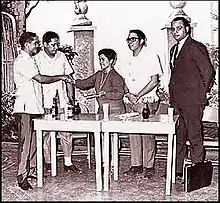Gladys de la Lastra
Gladys de la Lastra (Penonomé, 6 March 1932 - Panama City, 28 September 2005) was a drummer, composer and musician from Panama.[1]
Gladys de la Lastra | |
|---|---|
 Gladys de la Lastra | |
| Born | 6 March 1932 Penonomé |
| Died | 28 September 2005 Panama City |
| Occupation | Musician |
Biography
De la Lastra was born on 6 March 1932 in Penonomé. She studied at the Simeón Conte School and then studied at the National Institute of Panama for her secondary schooling.[2] She went on to study at the National Institute of Music.[3] After graduating she de la Lastra taught music at the State of Israel and Old Panama School.[2]
De la Lastra's first compostion was "La Princesa del Zaratí", which was composed in a bolero-style for the centenary of Coclé, when she was aged 17.[3] This song highlighted national values.[2] De la Lastra believed that her musical ability was a gift from god.[4] Religious and nationalist themes were found throughout her work and she was a member of the Trade Union of Art Workers of Panama (SITAP).[2]
De la Lastra died on 28 September 2005 and was hailed as a national hero.[3] Her coffin was pulled by white horses through the streets of Penonomé, which were lined with people.[5]
Music
Little piece of land that God gave me
My Panamanian blood is a warming fire
That ignites joy to the heart where I go.Panama Chiquita (translation)
De la Lastra is famous for her guitar-playing and drumming. She wrote many songs throughout a long career, some of which include:
- Romance Salinero
- If the Treaty
- Bolívar American Hero
- Portobelo
- Already Enter the Canal Zone
- Summer Dreams
- Sovereignty
- Chiriquí Grande
- My Penonomé
- Cristiano the Church is You
- A Santa Ana
- Victoriano Lorenzo
- El Proyecto del Bayano
- Ingenio La Victoria
- La Guerra del Banano
- Panama Chiquita (one of the last pieces she composed)[6]
De la Lastra composed over 200 songs during her career,[7] as well as anthems for the University of Panama and for the Centenary of the Republic of Panama.[6]
Awards
1949 - Medal of Honour awarded by the Municipal Council of Penonomé[3]
1960 - Cocle's Favourite Daughter[2]
1961 - Anayansi Award for Publicity Interamericana for the composition Panama Soberana[2]
1981 - Commander of the Order Belisario Porras[2]
1981 - First Prize at the Festival of the Mediterranean and Latin American Tourist Song, held in Estoril (Portugal), the 'Golden Caravel' trophy for the song The Drummer I Have[2]
1996 - Intellectual Woman of the Year selected by the Circle of Intellectual Women of Panama (CIMIP)[6]
2005 - Order Vasco Núñez de Balboa[2]
Legacy
The Gladys de la Lastra Festival has been held annually since 2013 in Penonomé and is dedicated to the work of the singer.[3] After he death the mayor Agustín Méndez, hoped to erect a statue and name a street after her.[8] Every 3 November, schools across Panama sing her song La Angoustoura.[9]
de la Lastra in the Media
References
- Panamá, GESE-La Estrella de. "La poetisa Gladys De La Lastra vuelve a Coclé". La Estrella de Panamá (in Spanish). Retrieved 2020-01-07.
- Del Vasto, César. "Gladys de la Lastar". National Library, Panama.
- Anonymous (2005-09-28). "Muere Gladys de La Lastra". Panamá América (in Spanish). Retrieved 2020-01-06.
- LatinOLStudio.com (2018-11-09). "Gladys De La Lastra una tamborera muy recordada". LatinOL.com (in Spanish). Retrieved 2020-01-07.
- Gladys De La Lastra. despedida Penonomé, retrieved 2020-01-07
- "TerraSon Panamá ~ Gladys De La Lastra". www.geocities.ws. Retrieved 2020-01-06.
- "CRITICA EN LINEA: portada". portal.critica.com.pa. Retrieved 2020-01-07.
- "Penonomeños recordaron a compositora Gladis de La Lastra". El Siglo (in Spanish). Retrieved 2020-01-07.
- Anonymous (2013-09-29). "Gladys De La Lastra, tamborera insigne". Critica. Retrieved 2020-01-07.